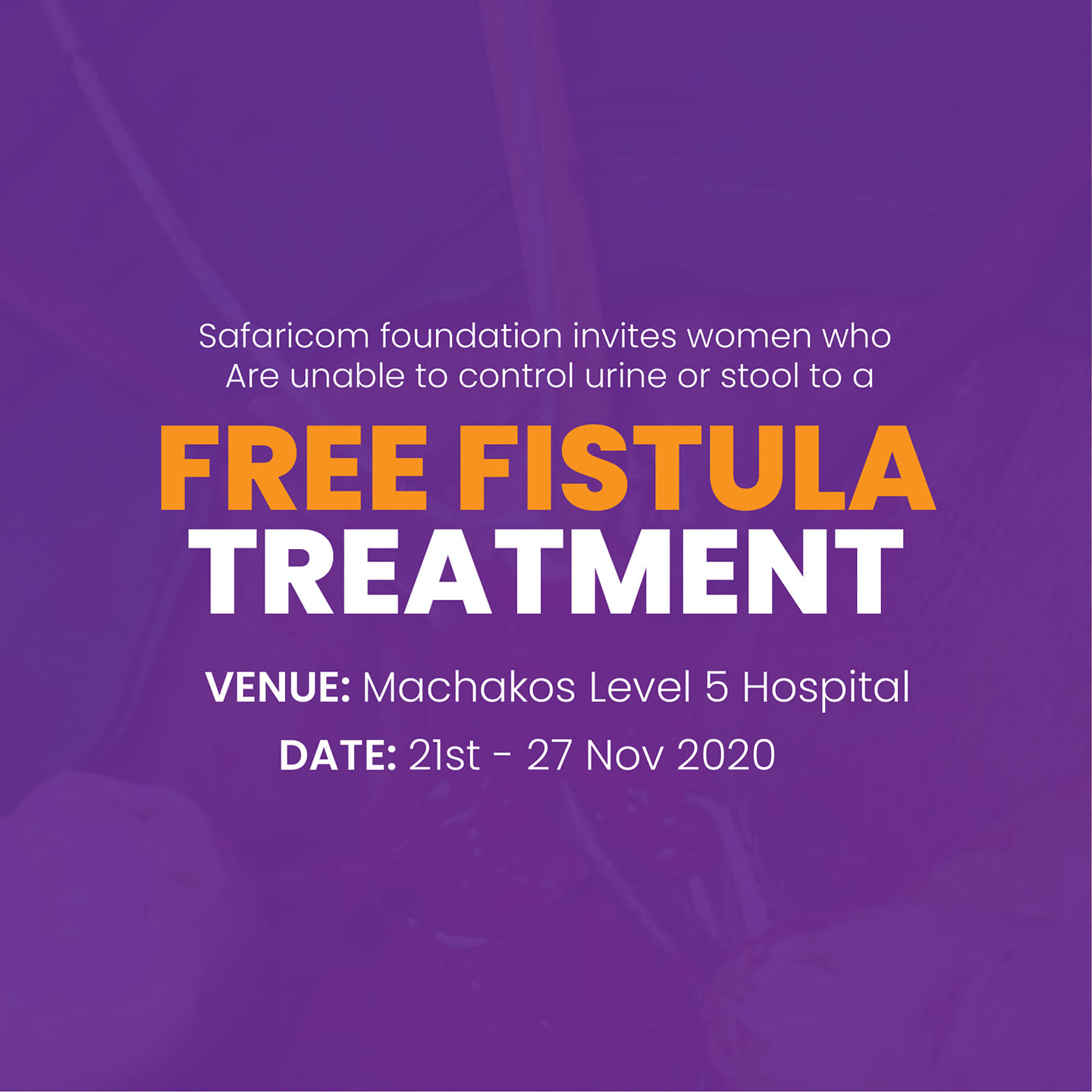Free Fistula Treatment

Safaricom Foundation invites women who are unable to control urine or stool to a free Fistula treatment camp at Machakos Level 5 Hospital from 21 – 27 Nov 2020
WHAT IS FISTULA
A fistula is an abnormal connection or passageway that connects two organs or vessels that do not usually connect. They can develop anywhere between an intestine and the skin, between the vagina and the rectum, and other places. The most common location for a fistula is around the anus.
TYPES OF FISTULAS:
ANAL FISTULAS/PERIANAL FISTULAS.
Abnormal connection between the epithelialized surface of the anal canal and the perianal skin.
- Anorectal Fistula occurs between the anal canal and the skin around the anal opening.
- Rectovaginal or Anovaginal Fistula occurs when a hole develops between the rectum or anus and the vagina.
- Colovaginal Fistula occurs between the colon and the vagina.
URINARY TRACT FISTULAS.
Abnormal openings within a urinary tract organ or an abnormal connection between a urinary tract organ and another organ.
- Vesicouterine fistula occurs between the bladder and the uterus.
- Vesicovaginal fistula is where a hole develops between the bladder and the vagina.
- Urethrovaginal fistula is between the urethra and the vagina.
OTHER FISTULAS.
- Enteroenteral Fistula occurs between two parts of the intestine.
- Enterocutaneous or Colocutaneous Fistula occurs between the small intestine and the skin or the colon and the skin respectively.
Left untreated, fistulas can be traumatic, debilitating, and can do additional harm to your body. Nerve damage, infection, and kidney failure are associated with fistulas.
HOW COMMON ARE FISTULAS?
The World Health Organization (WHO) estimates that there are 50,000-100,000 new cases of fistulas every year. In places like Africa, obstetric fistulas are often left unaddressed due to lack of obstetric care. Thankfully in the United States, fistulas are often diagnosed early and cared for appropriately.
Prevention is the best treatment. Maintaining a good nutritional habit is a great way to maintain healthy tissue and to ward off fistulas. In addition, abstaining from smoking is important to promote fistula healing.
WHAT CAUSES A FISTULA?
In Africa, the most common cause of fistulas is childbirth and obstructed labor that is left unrelieved. While the incidence of fistulas due to complicated births is lower in the United States, other causes can create this troublesome condition. Crohn’s disease and diverticular disease are well known to cause fistula formation. In addition, those who are undergoing radiation therapy are at greater risk for a variety of fistulas.
WHAT ARE THE SYMPTOMS OF FISTULAS?
Depending on the type of fistula, here are some telltale sign
- Constant urine leakage from the vagina
- Irritation in the external female genital organs
- Frequent urinary tract infections (UTIs)
- Leakage of gas and/or feces into the vagina
- Fluid drainage from the vagina
- Nausea
- Vomiting
- Diarrhea
- Abdominal pain
If you have one or more of these symptoms, be sure to promptly discuss them with a healthcare provider.
FISTULA TREATMENT OPTIONS
For fistula repair, patients seek the expert advice from gynecologists, urogynecologists, or colorectal surgeons. Following the diagnosis of a fistula, the medical professional will decide the best plan of treatment based on its location, size, and condition. One treatment path may simply be controlling symptoms with a catheter. More severe fistula repair may require surgery.
MANAGEMENT
Non-invasive Treatment
- Fibrin glue. A specific medicinal adhesive used to seal fistulas.
- Plug. This is usually a collagen matrix used to fill the fistula.
- Catheters. Used to drain fistulas, catheters are usually employed on small fistulas to manage infection.
SURGICAL TREATMENT
- Transabdominal surgery. The fistula is accessed through an abdominal wall incision.
- Laparoscopic surgery. This is a minimally invasive surgery that involves a tiny incision and the use of cameras and small tools to repair the fistula.
PHARMACEUTICAL TREATMENT
Antibiotics or other medication may also be used to treat any infection associated with the fistula. Yet there is no pharmaceutical solution to eradicate fistulas at this time.
While fistulas pose a serious threat to your body, high treatment success should encourage you or someone dealing with fistulas to seek immediate help.

I admire your piece of work, thanks for all the interesting content . Jolynn Beale Elston